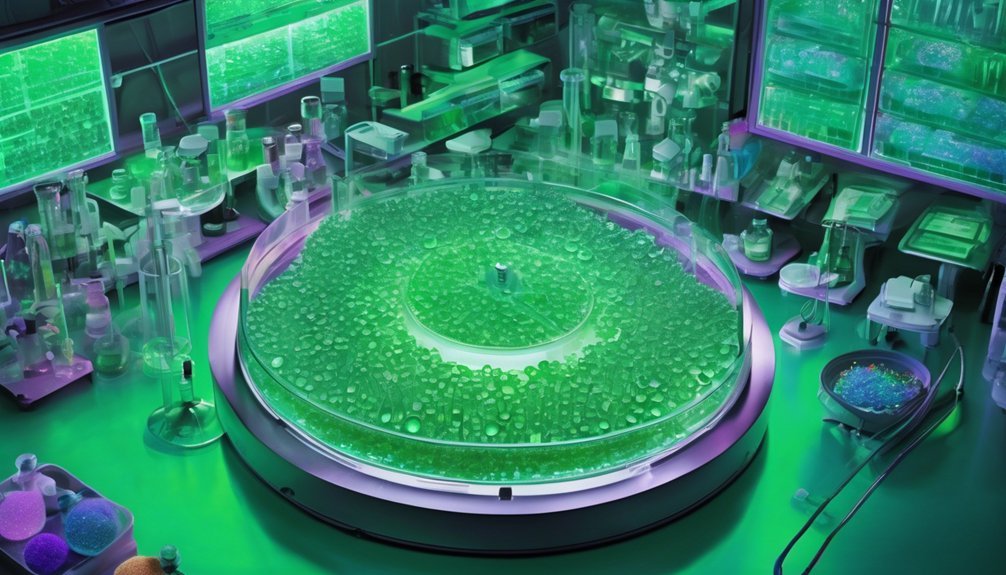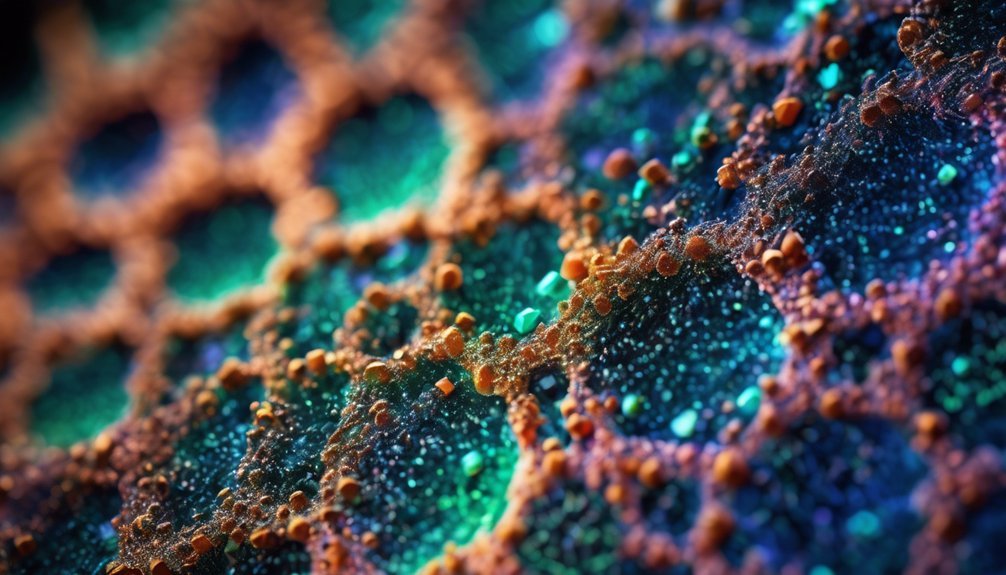Did you know that nutritional deficiencies can significantly impact the health and recovery of cancer patients? The journey through cancer treatment can lead to a cascade of challenges that affect your body's ability to absorb essential nutrients, leaving you vulnerable to a range of deficiencies that can worsen your overall well-being. Understanding how these deficiencies develop and the strategies to combat them is crucial in ensuring that you maintain strength, resilience, and vitality throughout your cancer journey.
Key Takeaways
- Cancer diagnosis impacts nutritional status.
- Treatments and symptoms affect eating habits.
- Dietary interventions crucial for managing deficiencies.
- Protein and vitamin D insufficiencies common.
- Consult oncology nutrition specialist for personalized advice.
Impact of Cancer on Nutrition
Navigating through a cancer diagnosis can significantly impact your nutritional status. The treatments, symptoms, and emotional stress associated with cancer can all affect your ability to eat well and maintain proper nutrition. This is where dietary interventions and nutritional counseling play a crucial role in supporting your health during this challenging time.
Dietary interventions tailored to your specific needs can help manage side effects like nausea, taste changes, and difficulty swallowing that often accompany cancer treatments. These interventions can also ensure that you're receiving the necessary nutrients to support your immune system and overall well-being.
Nutritional counseling provides personalized guidance on how to optimize your diet to meet your nutritional requirements and combat any deficiencies that may arise.
Protein Deficiency
Protein deficiency is a common concern among cancer patients undergoing treatment. Here are some essential points to consider:
- Dietary Interventions: Ensuring a well-balanced diet rich in high-quality proteins is crucial to prevent protein deficiency. Encourage the consumption of lean meats, poultry, fish, eggs, dairy products, legumes, nuts, and seeds.
- Protein Supplementation: In cases where dietary intake alone is insufficient, protein supplements may be recommended. These supplements can help meet the increased protein needs of cancer patients, especially during treatment.
- Consult with a Dietitian: It's advisable to consult with a registered dietitian who specializes in oncology nutrition. They can provide personalized dietary recommendations tailored to the individual's specific nutritional requirements and treatment plan.
Vitamin D Insufficiency
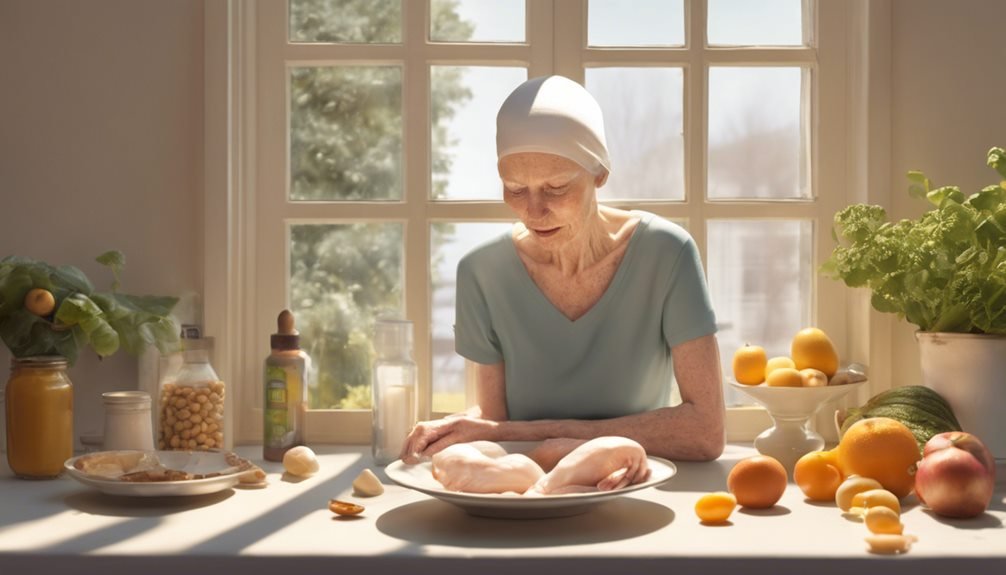
As you focus on addressing protein deficiency among cancer patients, another critical aspect to consider is Vitamin D insufficiency. Vitamin D plays a crucial role in bone health, which is especially important for cancer patients undergoing treatments that may impact bone strength.
One of the primary sources of Vitamin D is sun exposure. Encouraging patients to spend time outdoors in the sunlight, while being mindful of sun protection, can help boost their Vitamin D levels naturally.
However, some patients may have restrictions on sun exposure due to their treatment or other health concerns. In such cases, incorporating Vitamin D-rich foods like fatty fish, fortified dairy products, and eggs into their diet can be beneficial.
Monitoring and addressing Vitamin D insufficiency in cancer patients can contribute to overall well-being and treatment outcomes. By ensuring adequate Vitamin D levels, healthcare providers can support patients in maintaining optimal bone health, which is essential for their quality of life during and after cancer treatment.
Iron Deficiency Anemia
Addressing Iron Deficiency Anemia is crucial in the care of cancer patients. Iron plays a vital role in the body, especially during cancer treatment when the demand for red blood cells is high. Here are some key points to consider:
- Treatment Options
- Treatment for iron deficiency anemia often involves iron supplementation. Your healthcare provider may recommend oral iron supplements or, in more severe cases, intravenous iron therapy to replenish iron levels efficiently.
- Regular monitoring of iron levels through blood tests is essential to track progress and adjust treatment as needed.
- Dietary Interventions
- Incorporating iron-rich foods into your diet such as lean meats, leafy greens, nuts, and fortified cereals can help boost iron levels naturally.
- Consuming vitamin C-rich foods alongside iron-rich foods can enhance iron absorption in the body.
Malabsorption Issues
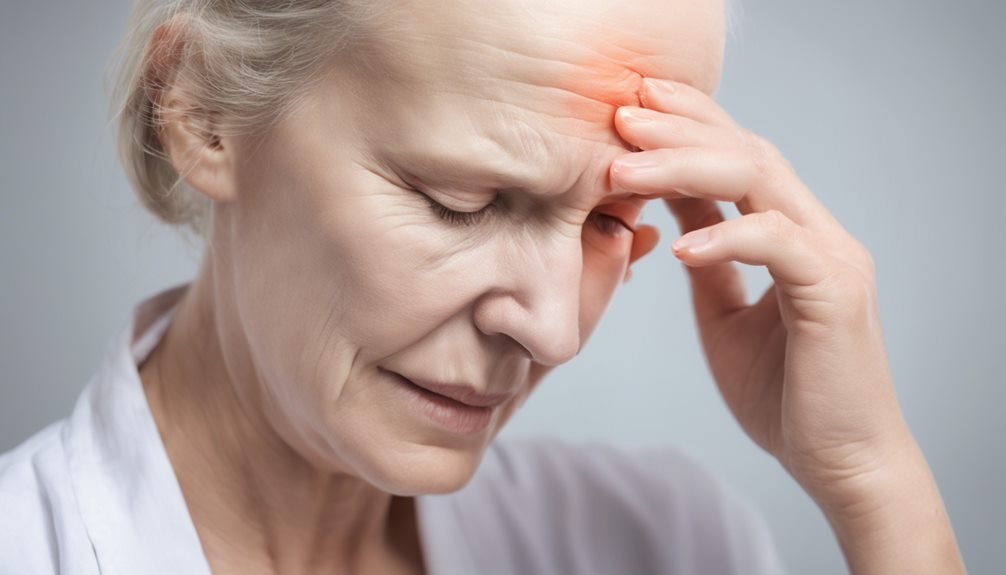
Iron deficiency anemia is just one piece of the complex puzzle when it comes to nutritional challenges in cancer patients. Malabsorption issues can exacerbate the already compromised nutritional status in individuals battling cancer. Digestive challenges and impaired nutrient absorption are common occurrences due to the aggressive nature of the disease and its treatments.
—
| Malabsorption Issues | Effects on Nutrition | Potential Solutions |
|---|---|---|
| Reduced absorption of key nutrients | Leads to deficiencies and weakened immunity | Supplementation and tailored diets |
| Impaired digestion of fats and proteins | Results in weight loss and muscle wasting | Enzyme replacement therapy |
| Decreased absorption of vitamins and minerals | Contributes to fatigue and weakness | Intravenous supplementation |
—
Understanding these challenges is crucial for healthcare providers to address the specific needs of cancer patients. If you or a loved one are facing malabsorption issues, working closely with a registered dietitian can help create a personalized nutrition plan to optimize nutrient intake and overall well-being.
Decreased Appetite
Nutritional challenges in cancer patients can manifest in various ways, and one common issue faced is decreased appetite. When cancer affects your body, appetite changes can significantly impact your overall well-being. Here are some key points to consider:
- Dietary interventions: It's crucial to focus on nutrient-dense foods that are appealing to you. Small, frequent meals rich in protein and healthy fats can help maintain your energy levels even if you don't feel like eating much at once.
- Appetite stimulants: Your healthcare provider may recommend medications or natural remedies to help boost your appetite. These can aid in increasing your desire to eat, ensuring you receive the necessary nutrients for your body to fight the cancer and cope with treatments.
- Seeking support: Don't hesitate to reach out to a dietitian or nutritionist specializing in cancer care. They can provide tailored advice and support to help you navigate through decreased appetite while ensuring your body receives the essential nutrients it needs to stay strong.
Weight Loss
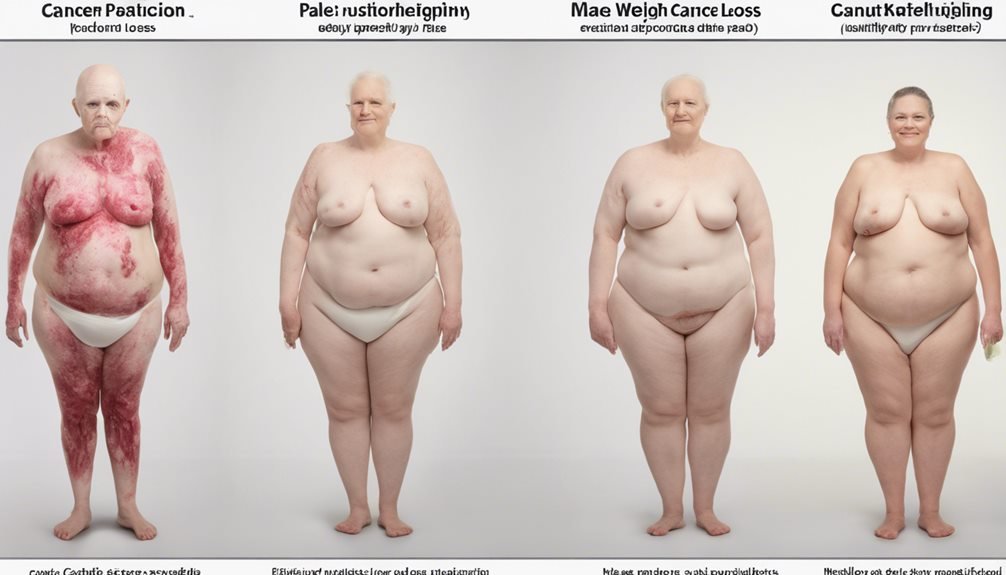
When cancer impacts your body, changes in appetite can lead to weight loss, which presents its own set of challenges. It's crucial to address weight loss promptly to prevent further complications.
Dietary interventions are essential to help you maintain a healthy weight and provide your body with the necessary nutrients to support your overall health during cancer treatment.
Nutritional counseling plays a vital role in managing weight loss by designing personalized meal plans tailored to your specific needs. These plans focus on nutrient-dense foods that can help you maintain or regain lost weight.
Working closely with a registered dietitian can provide you with the guidance and support needed to navigate the complexities of weight management during cancer treatment.
Electrolyte Imbalance
During cancer treatment, electrolyte imbalances can arise, affecting the proper functioning of crucial bodily processes.
Key Points About Electrolyte Imbalance:
- Fluid Regulation: Electrolytes like sodium, potassium, and calcium play a vital role in maintaining proper fluid balance in the body. Imbalances can lead to dehydration or fluid retention.
- Cellular Function: Electrolytes are essential for the proper functioning of cells, including nerve conduction and muscle contractions. Imbalances can disrupt these processes, causing weakness or even cardiac issues.
- Symptoms: Watch out for signs like muscle cramps, irregular heartbeat, weakness, confusion, or seizures. If you experience any of these, consult your healthcare team promptly.
Ensuring adequate intake of electrolyte-rich foods and staying hydrated can help prevent imbalances. Your healthcare provider may also recommend electrolyte supplements or intravenous therapy if necessary. Prioritize your body's needs during this challenging time to support overall well-being.
Nutrient Absorption Problems
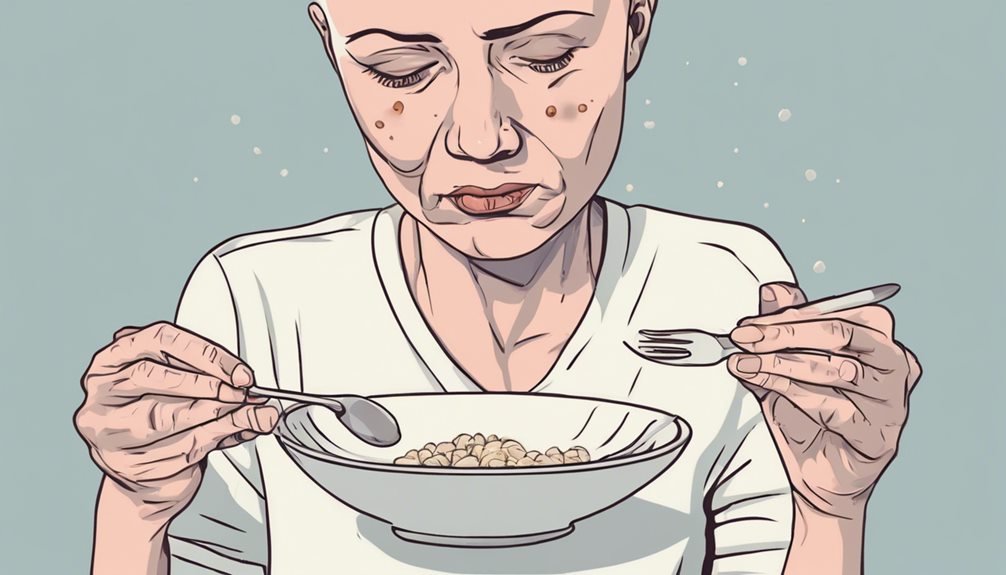
Experiencing electrolyte imbalances during cancer treatment can impact not only fluid regulation and cellular function but also your body's ability to absorb essential nutrients efficiently.
Digestive complications and metabolic changes often arise, leading to nutrient absorption problems in cancer patients. Chemotherapy, radiation, and certain medications can cause inflammation in the digestive tract, affecting the absorption of vital vitamins and minerals. This can result in deficiencies of key nutrients such as iron, vitamin D, and B vitamins, essential for overall health and immune function.
Metabolic changes in cancer patients can further exacerbate nutrient absorption issues. The body's altered metabolism during treatment may affect how nutrients are processed and utilized, leading to deficiencies even with an adequate diet.
Addressing these challenges requires a tailored approach that may involve dietary adjustments, supplementation, and close monitoring by healthcare providers. By recognizing and managing nutrient absorption problems promptly, you can better support your body's nutritional needs during cancer treatment, promoting overall well-being and enhancing the effectiveness of therapy.
Muscle Wasting
Muscle wasting, a common concern for cancer patients undergoing treatment, can significantly impact your physical strength and overall quality of life. It's crucial to address this issue with a proactive approach.
Here are three key points to consider:
- Rehabilitation strategies: Engaging in tailored exercise programs under the guidance of healthcare professionals can help maintain muscle mass and improve overall physical function during cancer treatment.
- Nutrition counseling: Working with a registered dietitian to ensure adequate caloric intake and protein consumption is essential in combating muscle wasting. They can create personalized meal plans to support muscle health and prevent further deterioration.
- Supportive therapies: In addition to exercise and nutrition, complementary therapies like massage, physical therapy, and acupuncture can aid in managing muscle wasting and improving overall well-being.
Immune System Suppression
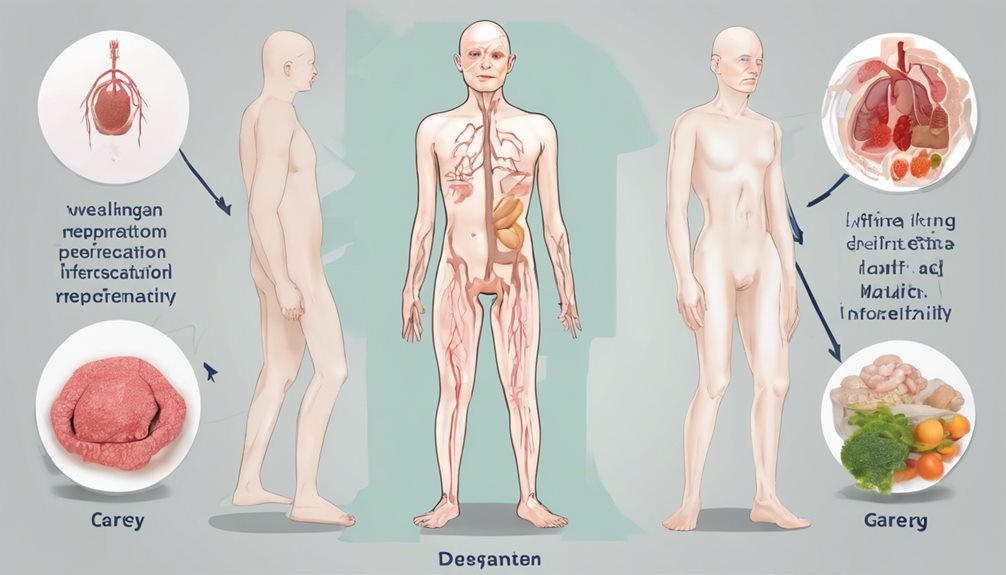
Amidst the challenges of cancer treatment, one critical aspect that warrants attention is the suppression of your immune system. Cancer and its treatments can weaken your immune response, making you more susceptible to infections and other health complications. This suppression occurs due to factors like chemotherapy, radiation therapy, and the cancer itself.
To combat immune system suppression, various treatment options are available. Your healthcare team may recommend medications to boost your immune function, such as growth factors or immunomodulating drugs. Additionally, they may suggest lifestyle modifications like maintaining a balanced diet rich in nutrients, regular exercise, and stress management techniques. These strategies can help support your immune system throughout your cancer treatment journey.
It's essential to communicate openly with your healthcare providers about any concerns regarding immune system suppression. By working together, you can develop a comprehensive plan to address this issue and optimize your overall well-being during cancer treatment.
Hormonal Imbalances
Facing the challenges of cancer and its impact on your body, another significant aspect to consider is the potential for hormonal imbalances. Hormonal regulation plays a crucial role in maintaining the body's equilibrium, and cancer can disrupt this delicate balance, leading to various issues. Here are three key points to help you understand hormonal imbalances in cancer patients:
- Hormonal regulation: Cancer can affect hormone-producing organs like the thyroid, adrenal glands, and ovaries, leading to imbalances in hormones such as cortisol, estrogen, and thyroid hormones.
- Metabolic adjustments: Hormonal imbalances in cancer patients can impact metabolism, leading to changes in energy levels, weight fluctuations, and alterations in appetite.
- Treatment implications: Understanding hormonal imbalances is crucial for managing cancer treatment side effects, as some therapies may further disrupt hormone levels, requiring close monitoring and potential interventions.
Being aware of the potential for hormonal imbalances during cancer treatment can help you navigate these challenges with the support of your healthcare team.
Frequently Asked Questions
Can Cancer Patients Take Supplements to Prevent Nutritional Deficiencies?
You can consider taking supplements to prevent nutritional deficiencies, but it's essential to prioritize supplement safety by consulting your healthcare provider. They can offer guidance based on your specific needs and medical history. Remember to follow dietary guidelines to ensure you're getting proper nutrition.
How Can Cancer Patients Maintain a Balanced Diet During Treatment?
Struggling to maintain a balanced diet during cancer treatment? Have you considered meal planning and dietary counseling? These two strategies can be game-changers.
With meal planning, you can ensure you're getting the right nutrients each day. Dietary counseling offers personalized guidance to meet your unique needs.
Are There Specific Foods to Avoid to Prevent Nutrient Deficiencies?
To prevent nutrient deficiencies, consider dietary restrictions that could impact nutrient absorption. Avoid processed foods high in sugar, salt, and unhealthy fats. Opt for whole foods rich in vitamins, minerals, and antioxidants. Incorporate a variety of fruits, vegetables, lean proteins, and whole grains into your meals. Stay hydrated and consult with a healthcare provider or nutritionist for personalized guidance on foods to include and avoid based on your specific needs.
Can Nutritional Deficiencies in Cancer Patients Lead to Other Health Issues?
Absolutely! Nutritional deficiencies in cancer patients can have long-term effects on overall health. In severe cases, they may lead to weakened immunity, delayed wound healing, and increased risk of infections.
However, addressing these deficiencies through proper nutrition and supplementation can significantly improve outcomes. Treatment options may include dietary modifications, vitamin supplements, and working closely with a healthcare team to monitor and manage nutrient levels for better health and well-being.
Is It Safe for Cancer Patients to Try Alternative Nutritional Therapies?
It's crucial for cancer patients to approach alternative nutritional therapies with caution. Dietary restrictions should be discussed with your healthcare team to ensure they complement your treatment plan. Herbal remedies may interact with medications or interfere with your body's response to cancer therapies.
Always seek evidence-based guidance from medical professionals before trying any alternative therapies to avoid potential risks to your health. Your well-being is the top priority when exploring treatment options.
Conclusion
You've learned about the significant impact of cancer on nutrition, leading to various deficiencies like protein, vitamin D, and iron. Did you know that up to 80% of cancer patients experience malnutrition during their treatment? This statistic highlights the urgent need for personalized nutrition interventions and monitoring to support their health and well-being. Remember, proper nutrition is crucial in the fight against cancer. Stay informed and take care of your body.


